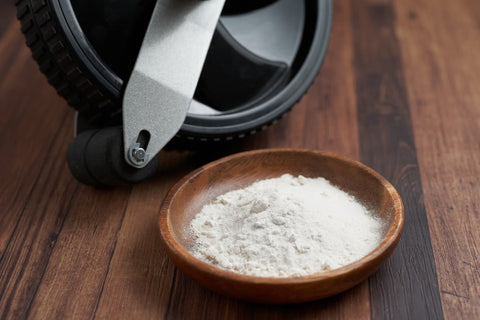What is Creatine?
Creatine is a naturally occurring compound and plays a pivotal role in your body's energy production system. On average, the body produces 1–2 grams of creatine per day. It is also found in various foods such as meat, seafood, and animal milk.
Despite its presence in various natural sources, you can take creatine supplements to achieve specific athletic or fitness goals. This is because creatine is often referred to as the “energy currency.”
When you engage in activities that require quick bursts of energy, such as lifting heavy weights or sprinting, creatine becomes an immediate and readily available source.
When taken in sufficient quantities, creatine supplements offer a range of benefits, including:
- Improved strength and duration during high-intensity workouts.
- Promoting muscle growth.
- Reducing exercise-induced muscle cell damage and inflammation.
- Boosting brain health, memory, and cognitive function.

How Creatine Influences Your Appetite?
Now, let's address the core question: Does creatine make you hungry?
Creatine does not directly stimulate hunger but can indirectly influence your appetite in several ways. Let’s discuss some of these below:
Increase in Energy
Supplementation with creatine aids in rapidly replenishing ATP (adenosine triphosphate). ATP is the primary energy molecule used during high-intensity exercise. The increased availability of ATP significantly improves the quality and duration of the workouts, allowing you to push your physical limits.
However, intense workouts use up energy, and your body signals hunger as a way of saying it needs to replenish depleted energy stores.
Metabolism and Muscle Growth
Your Basic Metabolic Rate (BMR) is the calories your body burns while at rest, performing functions like breathing and repairing cells. Creatine may boost your BMR by building more muscle, making your body burn extra calories even when inactive.
As your body burns more calories, it may signal an increased need for energy, possibly causing you to feel hungrier.
Water Retention
Another factor influencing hunger is water retention. Creatine causes your muscles to retain water. It can draw water into the muscles, a process known as cellular hydration.
Since this process contributes to enhanced muscle volume and an immediate increase in body weight, you may misidentify it as fat. The water retention will also mask hunger signals or create a feeling of fullness.
However, this is a temporary side effect observed only in the early stages of supplementation. Understanding this helps you make informed choices about your diet and expectations when using creatine as part of your fitness routine.
So, Why Am I Gaining Weight When Taking Creatine Supplements?
If you continue to eat consistently while taking creatine, it's essential to recognise that the supplement itself doesn't directly make you gain fat. Instead, weight gain is more closely associated with your unique dietary habits and caloric intake.
While creatine can enhance performance and contribute to muscle growth, responsible eating habits remain crucial in achieving and maintaining a healthy weight.
6 Practical Tips for Taking Creatine Supplements
Let's examine the essential tips to optimise your creatine-experience and maximise results. From proper dosage to staying well-hydrated, these strategies can significantly enhance the effectiveness of your creatine intake.
1: Eat a Healthy Diet
Ensure your diet is well-balanced and includes a variety of nutrient-rich foods. Creatine supplements work best when complemented by a diet rich in proteins, carbohydrates, vitamins, and minerals. This supports overall health and maximises the benefits of creatine for performance and muscle growth.
2: Take Precise Dosage
You should start taking creatine with a loading phase of 10 grams to 20 grams a day for the initial seven days. Follow this with a maintenance dose of 2 grams to 5 grams.
Make sure you stick to the recommended dosage. Although creatine is one of the safest supplements, excessive intake can lead to potential side effects such as bloating, stomach discomfort, and even kidney damage.
3: Time the Dose Right
You can take creatine supplements any time of the day. Additionally, Research shows no significant difference in the result between taking creatine before or after your workout.
However, in the early days of creatine loading, it is necessary to divide the dose throughout the day instead of taking it in one go. This will help your body adjust to the effects of creatine and enhance absorption.
4: Stay Hydrated
Since creatine is linked to water retention, you will feel the urge to drink more water, especially during the initial stage of supplementation. If you are not drinking enough water, you may misinterpret the thirst for hunger.
When taking creatine or working out, it is necessary to maintain adequate fluid intake. This prevents dehydration, which can adversely affect your performance and overall health.
5: Mix It With the Right Ingredients
Many people who consume creatine supplements do not like their taste. This is why some mix it with beverages like fruit juices and protein shakes.
However, some drinks are completely sugar-based, and taking them can fluctuate your sugar levels. This can influence your appetite and make you feel hungrier. Instead, it is ideal to mix creatine with warm water for better dilution.
6: Listen to Your Body Cues
Every individual responds differently to creatine supplementation. Factors such as genetics, overall diet, and individual metabolic rates can influence how creatine affects appetite and physical performance.
Pay attention to how your body reacts and adjust your supplementation accordingly. If you have any concerns or experience unusual symptoms, consult with a healthcare professional for advice.
FAQs About Creatine
What is the best form of creatine?
The best form is creatine monohydrate, known for its effectiveness, safety, and extensive research backing. It has superior absorption and utilisation by the muscles compared to other forms like creatine ethyl ester or kre-alkalyn.
Can I take anabolic steroids with creatine?
The use of anabolic steroids is proven to increase weight. It can also impact hormonal balance, and combining them with creatine may affect the kidney and cardiovascular system.
Can creatine be taken by individuals with specific medical conditions?
Creatine is generally safe, even for young children. However, it's advisable for individuals with pre-existing medical conditions to consult a healthcare professional before starting creatine supplementation.
Final Words
To conclude, the intake of creatine does not make you hungry.
However, its impact on energy levels, metabolism, and water retention can influence appetite signals. Recognising these factors and adjusting dietary habits is crucial for optimising your fitness routine.
Are you ready to enhance your fitness journey? Take the next step towards achieving your performance goals and choose our high-quality creatine supplements that align with your needs.

